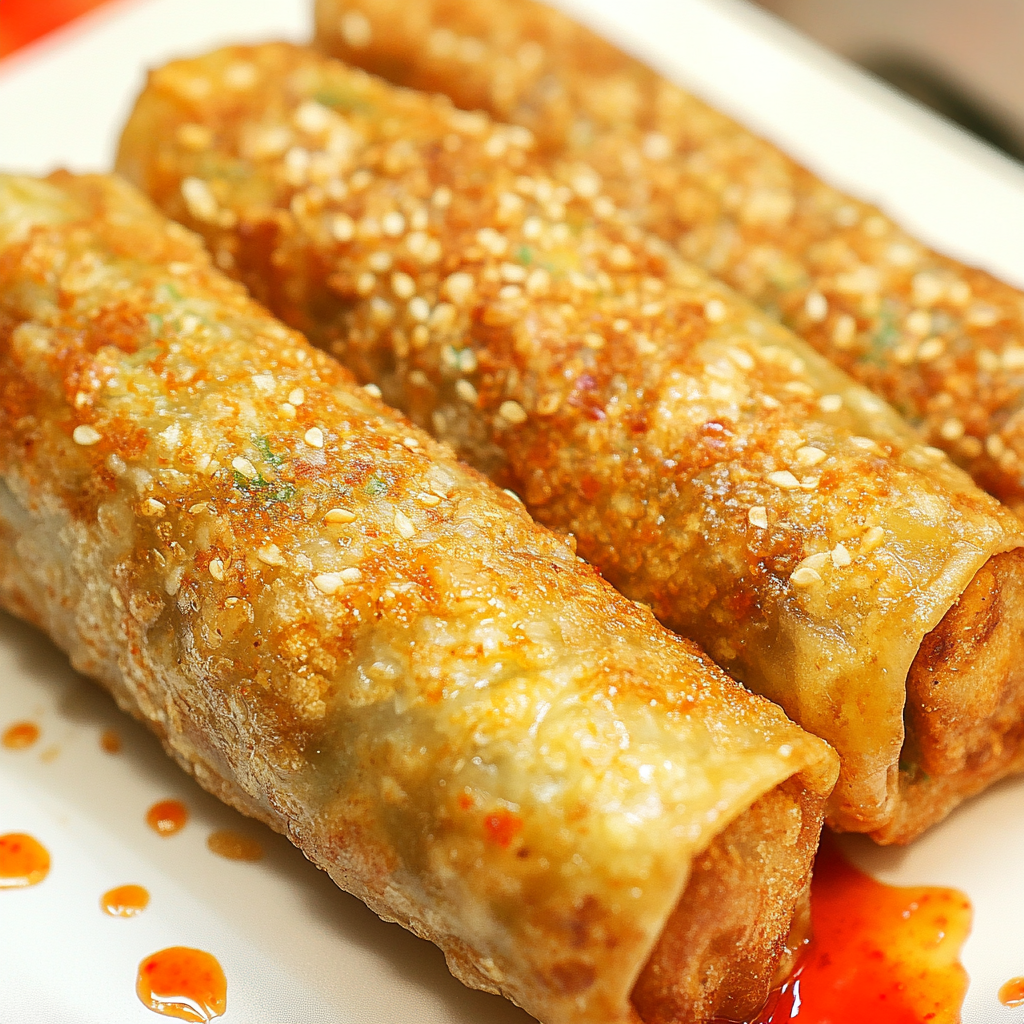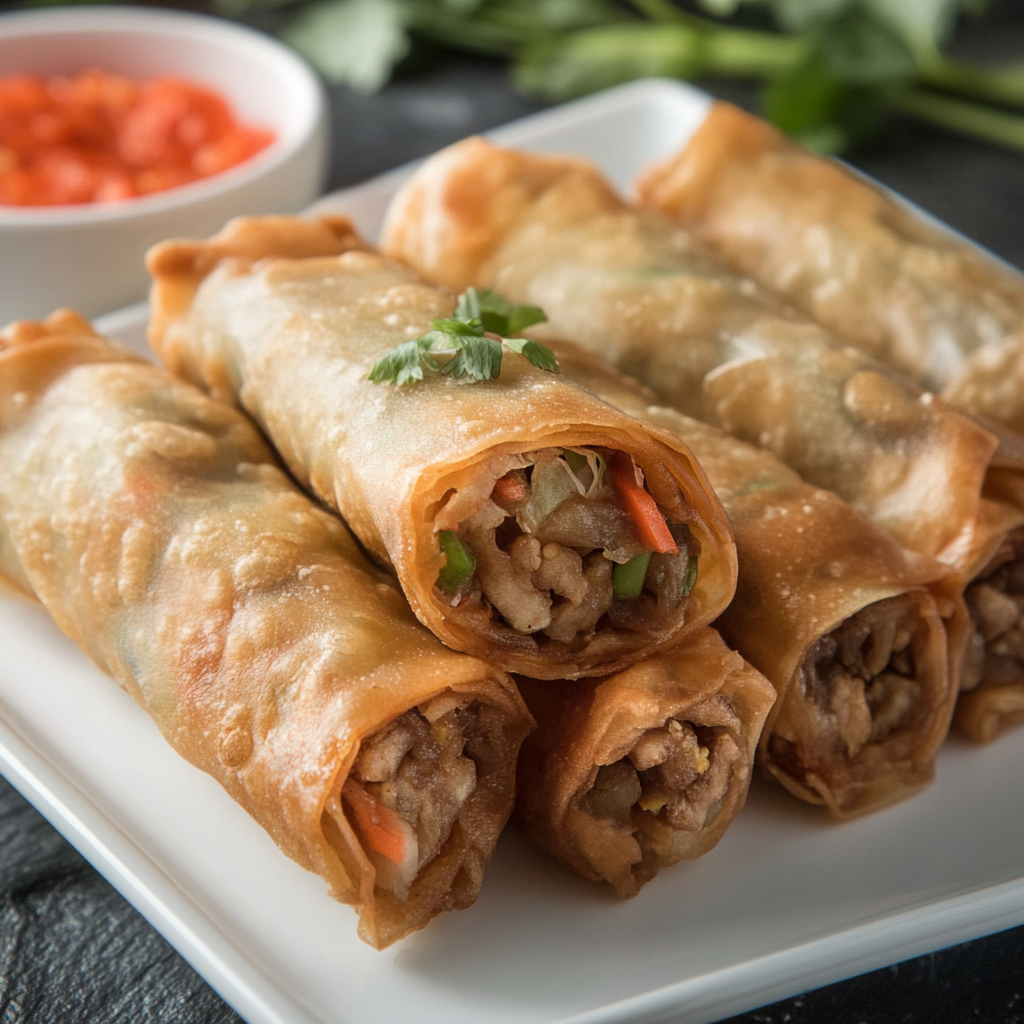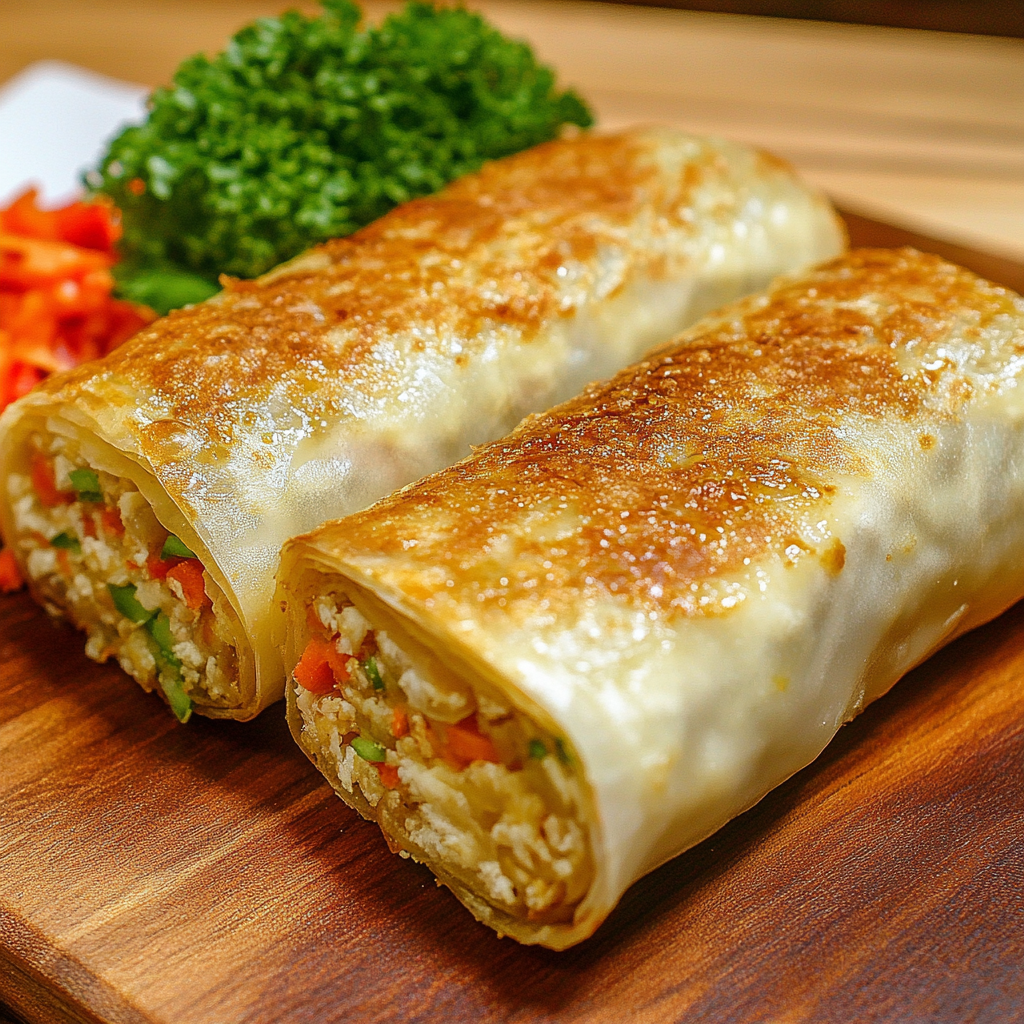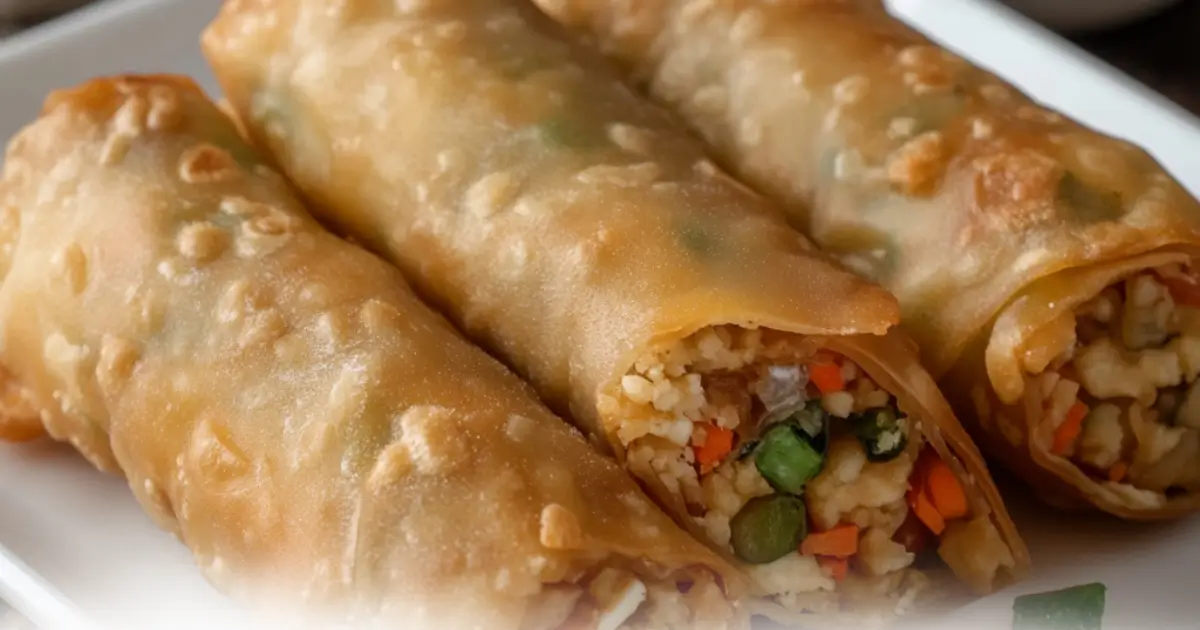Veggie egg rolls are a favorite for many, offering a crispy, flavorful bite that’s both satisfying and versatile. But are they really a healthy choice, or do they fall into the indulgent snack category? In this article, we’ll dive into the nutritional value, potential health benefits, and downsides of veggie egg rolls. We’ll also explore how you can make them a healthier addition to your diet. By the end, you’ll have all the insights needed to answer the question: Are veggie egg rolls healthy?
Table of contents
Introduction to Veggie Egg Rolls
Understanding Veggie Egg Rolls
Veggie egg rolls are a staple in many cuisines, particularly in Asian-inspired dishes. These delightful snacks are typically made by wrapping a medley of vegetables like cabbage, carrots, and mushrooms in a thin pastry sheet and cooking them until crispy. While some are deep-fried for a golden crunch, others can be baked or air-fried for a lighter texture.

Packed with flavor, they’re often paired with dipping sauces like sweet chili, soy, or peanut sauce. The filling can vary widely, catering to different preferences and dietary needs. This makes them not only delicious but also customizable.
Popular Ingredients in Veggie Egg Rolls
The beauty of veggie egg rolls lies in their versatility. Commonly used ingredients include:
- Cabbage: Rich in fiber and low in calories, making it a nutritious base.
- Carrots: Loaded with vitamin A, supporting vision and immune health.
- Mushrooms: A great source of antioxidants and plant-based protein.
- Onions and Garlic: Enhancing flavor while adding anti-inflammatory properties.
- Rice Noodles or Tofu: Sometimes added for texture and protein.
The choice of ingredients plays a significant role in determining whether veggie egg rolls are a healthy snack or just another indulgence. Homemade versions often fare better than their store-bought or restaurant counterparts, which may contain hidden additives and excessive sodium.
Stay tuned as we delve into the nutritional breakdown and health benefits of veggie egg rolls in the next section!
Nutritional Overview
Macronutrient Breakdown
When asking “Are veggie egg rolls healthy?”, their macronutrient content is a good starting point. A typical veggie egg roll contains a balanced mix of carbohydrates, fats, and protein. Most varieties, especially homemade ones, are moderate in calories, ranging from 100 to 150 calories per roll. Here’s a closer look at the breakdown:
- Carbohydrates: Veggie egg rolls often have around 15–20 grams of carbs per serving, mainly from the wrapper and vegetables. These carbs provide a quick energy boost.
- Protein: With about 4–5 grams of protein per roll, they’re not a powerhouse, but they do contribute to your daily protein intake, especially if tofu or beans are added.
- Fats: The fat content depends heavily on the cooking method. Baked or air-fried rolls are lower in fat, while fried ones can contain up to 7 grams of fat or more.

While store-bought options often add preservatives or excess oil, making them less healthy, fresh, homemade rolls can be a nutritious snack or appetizer.
Key Vitamins and Minerals
Veggie egg rolls are surprisingly rich in several essential nutrients. Thanks to their vegetable-based filling, they provide:
- Vitamin A: Carrots in the filling are packed with beta-carotene, which supports healthy eyes and skin.
- Vitamin C: Crucial for immune health, this is often found in cabbage and other leafy greens.
- Fiber: With up to 2–3 grams of fiber per roll, they help with digestion and keep you feeling full longer.
- Potassium and Magnesium: Found in mushrooms and other vegetables, these minerals support muscle function and overall heart health.
Homemade veggie egg rolls are a better source of these nutrients compared to frozen or pre-packaged options, which may skimp on fresh, high-quality vegetables. In the next section, we’ll explore how these nutritional benefits contribute to overall health.
Health Benefits of Veggie Egg Rolls
Rich in Fiber and Low in Calories
One of the standout benefits of veggie egg rolls is their high fiber content. Vegetables like cabbage and carrots contribute to a healthy digestive system and can help lower cholesterol levels. Additionally, the calorie count in baked or air-fried veggie egg rolls makes them a guilt-free snack, ideal for those watching their weight.
For instance, swapping fried versions with baked alternatives reduces fat intake significantly. This is an easy way to enjoy their crispy texture without compromising your health goals.

A Good Source of Plant-Based Nutrients
Veggie egg rolls cater wonderfully to plant-based diets. Ingredients like mushrooms and tofu provide essential nutrients such as protein and antioxidants, which help repair cells and fight free radicals. They’re also rich in vitamins and minerals, which contribute to maintaining strong bones, boosting immunity, and supporting overall wellness.
If you’re asking, “Are veggie egg rolls healthy?”, the answer is often yes—particularly when they’re made with fresh ingredients and prepared using healthy cooking methods.
How Homemade Versions Compare to Store-Bought
Homemade veggie egg rolls have a clear advantage over store-bought or restaurant varieties. Why? Because you control what goes into them! Many pre-packaged options are loaded with sodium and unhealthy oils, which can lead to bloating or increased cholesterol if consumed regularly.
By making them at home, you can choose:
- Whole-grain wrappers for added fiber.
- Low-sodium soy sauce to cut back on salt.
- A variety of fresh veggies to maximize nutrients.
Overall, veggie egg rolls can be a healthy choice when prepared thoughtfully. However, as we’ll discuss in the next part, certain pitfalls like frying and hidden additives can diminish their health appeal.
Potential Downsides and Considerations
Fried vs. Baked Veggie Egg Rolls
One of the biggest factors in determining “Are veggie egg rolls healthy?” is how they’re prepared. Fried veggie egg rolls are often high in unhealthy fats and calories due to the oil used in frying. Over time, consuming too many fried foods can lead to issues like weight gain or high cholesterol. On the other hand, baked or air-fried options use less oil and retain the crispy texture without the added fat.
For those looking to enjoy veggie egg rolls guilt-free, opting for baked versions is the way to go. Air fryers are also a fantastic option, offering a similar crunch with only a fraction of the oil.
Hidden Additives in Pre-Packaged Varieties
Pre-packaged veggie egg rolls may not be as healthy as they appear. Many frozen or restaurant-made options contain hidden additives like preservatives, flavor enhancers, or high sodium levels. Excessive sodium, for instance, can contribute to bloating, high blood pressure, and an increased risk of heart disease.
To avoid these pitfalls, always check nutrition labels and ingredient lists. Homemade rolls give you full control over the ingredients, allowing you to skip unnecessary additives.
Impact of High Sodium Levels
High sodium content is a common issue with store-bought veggie egg rolls. While sodium adds flavor and acts as a preservative, too much can disrupt your health. According to dietary guidelines, adults should limit sodium intake to 2,300 milligrams per day—but just a few frozen egg rolls could use up a large chunk of that limit.
For healthier options, consider making your own veggie egg rolls at home or choosing brands that prioritize natural ingredients and reduced sodium.
Tips for Making Healthier Veggie Egg Rolls
Choosing Healthier Wrappers and Fillings
The choice of wrapper and filling plays a big role in making veggie egg rolls healthier. Opt for whole-grain wrappers, which are higher in fiber and more nutritious than traditional ones. Fill them with nutrient-packed vegetables like spinach, bell peppers, and zucchini to maximize the health benefits. Adding tofu or chickpeas can also boost the protein content.
For a twist, you can try adding superfoods like kale or chia seeds for extra fiber and antioxidants.
Baking Instead of Frying
To keep your veggie egg rolls lighter, bake them instead of frying. Baking requires little to no oil, reducing the fat content significantly while still delivering a satisfying crunch. For an even crispier texture, use an air fryer, which uses circulating hot air to mimic the effects of deep frying with minimal oil.
Incorporating Superfoods into Recipes
Why not supercharge your veggie egg rolls? Adding superfoods like ginger, turmeric, or flaxseeds can enhance both the flavor and nutritional value. Ginger and turmeric offer anti-inflammatory properties, while flaxseeds provide omega-3 fatty acids for heart health.
For more delicious and nutritious recipe ideas, check out this healthy recipe collection on Zena Recipes.
How Veggie Egg Rolls Fit into a Balanced Diet
Pairing Veggie Egg Rolls with Healthy Sides
So, are veggie egg rolls healthy enough to be a regular part of your diet? The answer depends on how they’re served. Pairing them with nutrient-rich sides is key to creating a balanced meal. A fresh, vibrant salad or steamed greens like broccoli can complement the flavors of the rolls while boosting fiber and vitamins.
Alternatively, a light soup, such as miso or vegetable broth, can make the meal more filling without adding extra calories. Avoid pairing egg rolls with high-sodium or sugar-heavy dips—opt for healthier alternatives like hummus or guacamole instead.
Moderation and Serving Sizes
Even the healthiest veggie egg rolls should be eaten in moderation. Because the wrapper contains carbs and the fillings can be calorie-dense, eating too many in one sitting might tip the calorie scale. A serving size of 2–3 rolls is typically enough for a satisfying appetizer or light meal.
Incorporating them occasionally into your weekly menu allows you to enjoy their delicious crunch without overdoing it. When paired with fresh vegetables or whole grains, they can fit seamlessly into a well-rounded diet.
FAQs
Are Veggie Egg Rolls Good for Weight Loss?
Veggie egg rolls can support weight loss when prepared healthily. Baking or air-frying them reduces calories, while using nutrient-dense vegetables keeps them low in fat and high in fiber. Pairing them with a light side, like a salad, makes for a satisfying, low-calorie meal.
Can Veggie Egg Rolls Be Gluten-Free?
Yes, veggie egg rolls can be gluten-free if you use rice paper or gluten-free wrappers. Additionally, ensure the fillings and dipping sauces are free of hidden gluten ingredients like soy sauce. Tamari or coconut aminos are excellent alternatives.
What Are the Healthiest Dipping Sauces for Egg Rolls?
The healthiest dipping sauces are those low in sodium and sugar. Opt for natural options like a homemade soy-ginger glaze, spicy mustard, or a yogurt-based dip. These choices can enhance flavor without adding unnecessary calories.

